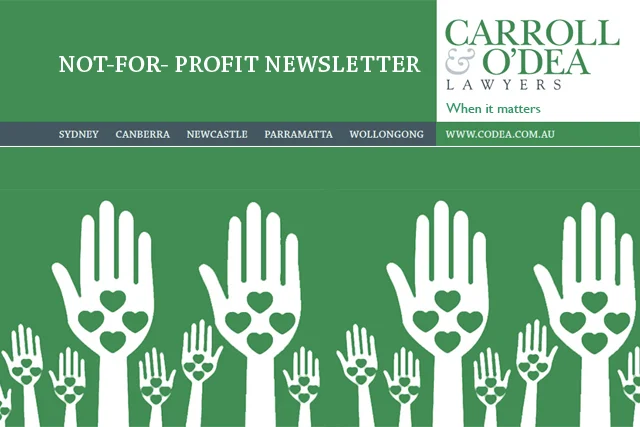
Not-For-Profit Newsletter – July 2012
Published on July 17, 2012 by Josephine Heesh
Australian Charities and Not for Profit Commission Bill 2012
On 10 July 2012, the government referred the next draft of the ACNC Bill to the House of Representatives Standing Committee on Economics for further review over the Winter break. Submissions can be made to the Committee by 20 July 2012.
While the following is not an absolute guarantee, until the Committee makes its recommendations, this last draft of the Bill, contains the following relevant provisions.
Significant Exemption
Basic Religious Charities have been granted exemption from:
(i) Lodging annual financial reports
(ii) Complying with governance standards
(iii) Power of the Commissioner to suspend or remove a director or trustee (called a “responsible entity”)
They have not been granted exemption from the need to register as a charity or to lodge an annual information statement.
They have not been granted exemption from external conduct standards (ie relevant for activities conducted outside Australia).
Basic Religious Charity is defined as:
(a) a registered entity (on the ACNC register);
(b) an entity with a purpose that is the advancement of religion (only)(column 2, item 3 subsection 25-5(5)
Those religious charities which also fall within any of the following categories, are not exempt:
(a) the relief of poverty, sickness or needs of the aged – such an entity likely to be a public benevolent institution;or
(b) the advancement of education; or
(c) purposes beneficial to the community, or
(d) the prevention or control of diseases in human beings, or for the provision of child care services, or
(e) generally as a public benevolent institution.
A Basic Religious Charity does not fit the definition if:
(a) it is a body corporate registered under the Corporations Act 2001; or
(b) it is incorporated under an association incorporations act or is an aboriginal corporation or a Norfolk Island corporation;
Nor
If it is a deductible gift recipient;
Nor
If it forms part of a reporting group (either joint reporting or collective reporting);
Nor
If it has received a grant from an Australian government agency either in the current financial year or the (previous two financial years.)
Small, Medium, Large Entities (which include individual, body corporate, body politic, unincorporated associations, trusts) fall within the categories now defined as small, medium or large.
· Small – revenue less than $250,000 per annum;
· Medium –revenue less than $1,000,000 per annum which is not a small entity;
· Large – any entity that is not small or medium.
Annual information statement
All entities (including a Basic Religious Charity) whether small, medium or large must lodge an Annual Information Statement. This statement will contain increasing levels of detail depending upon whether the entity is small, medium or large and will mainly go to establishing that an entity has performed its objects in the preceding reporting period.
The first Annual Information Statement reporting period will cover the period ending 30 June 2013 and must be lodged within six months of the end of that period.
A Basic Religious Charity is exempt
For all other entities:-
- Small entities do not need to lodge financial reports.
- Medium entities need to lodge financial reports but they need not be audited; they can simply be reviewed.
- Large entities must lodge financial reports which are also audited
The first Financial Reporting Statement will cover the period ending 30 June 2014 and must be lodged within six months of the end of that period. If an entity is already using a substituted accounting/reporting period, it can give notice to the ACNC within six months of 1 October 2013 and those entities can continue to use their alternative reporting period. If a new entity wishes to use a different reporting period to 30 June it must apply to ACNC at the time of application for registration.
These comments are preliminary. We will provide fuller reports as the process with the Bill unfolds.
Josephine Heesh
11 July 2012

